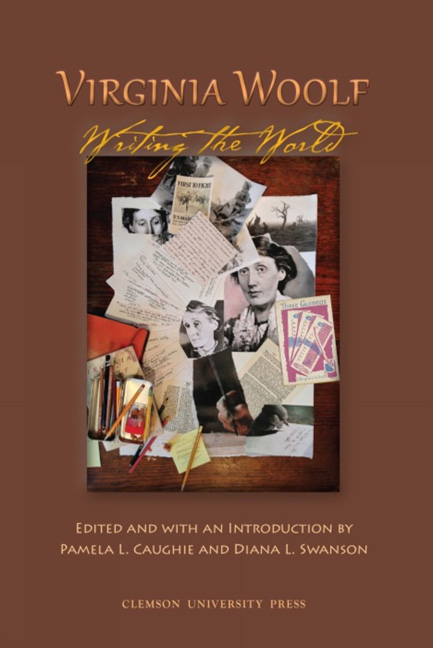Book contents
- Frontmatter
- Table of Contents
- Introduction
- Acknowledgmen
- Abbreviation
- WAR AND PEACE
- WORLD WRITER(S)
- ANIMAL AND NATURAL WORLD
- “And the donkey brays”: Donkeys at Work in Virginia Woolf
- Companion Creatures: “Dogmanity” in Three Guineas
- Virginia Woolf's Object-Oriented Ecology
- The Bodies In/Are The Waves
- Stretching our “Antennae”: Converging Worlds of the Seen and the Unseen in “Kew Gardens”
- “The Problem of Space”: Embodied Language and the Body in Nature in To the Lighthouse
- “Whose Woods These Are”: Virginia Woolf and the Primeval Forests of the Mind
- WRITING AND WORLDMAKING
- Notes on Contributors
- Conference Program
- Appendix: Virginia Woolf Conference Exhibit Items, Newberry Library
“The Problem of Space”: Embodied Language and the Body in Nature in To the Lighthouse
from ANIMAL AND NATURAL WORLD
- Frontmatter
- Table of Contents
- Introduction
- Acknowledgmen
- Abbreviation
- WAR AND PEACE
- WORLD WRITER(S)
- ANIMAL AND NATURAL WORLD
- “And the donkey brays”: Donkeys at Work in Virginia Woolf
- Companion Creatures: “Dogmanity” in Three Guineas
- Virginia Woolf's Object-Oriented Ecology
- The Bodies In/Are The Waves
- Stretching our “Antennae”: Converging Worlds of the Seen and the Unseen in “Kew Gardens”
- “The Problem of Space”: Embodied Language and the Body in Nature in To the Lighthouse
- “Whose Woods These Are”: Virginia Woolf and the Primeval Forests of the Mind
- WRITING AND WORLDMAKING
- Notes on Contributors
- Conference Program
- Appendix: Virginia Woolf Conference Exhibit Items, Newberry Library
Summary
In her novel To the Lighthouse (1927), Woolf articulates an ecological consciousness and champions an experimental language that is constantly changing as the sentient body interacts with the volatile forces inherent to the natural environment. Situating the human body within the vast natural landscape, Woolf erodes sharp distinctions between human and nonhuman nature by demonstrating how irregular natural forces compel the individual to contemplate his or her place within a schema of shifting geographies. In doing so, Woolf grapples with similar concerns that later ecocritics, such as Heather Sullivan and Christina Alt, articulate in order to stress the complex matrix that consists of human beings and natural environments. In her strategic deformation of linguistic codes that would promote homogeneity and communicative ease, Woolf advances the subversive plasticity of a protolanguage rooted in the body. I argue that Woolf moves beyond commonplace understandings of language as a system of representation as she examines the interplay between ecstatic motile forms of “embodied language” and transformative natural processes. Her interest in investigating the ecological implications of an embodied language is especially apparent in “On Being Ill” (1926), and later in “Craftsmanship” (1937), her contribution to a radio broadcast titled “Words Fail Me.” By placing these essays in dialogue with To the Lighthouse, we can see the development of an experimental language that frustrates denotative meaning in favor of evoking the sensorial apparatus of the body as it interacts with, aff ects, and is aff ected by volatile forces in the natural environment.
In her essay, “On Being Ill,” Woolf advocates “a new hierarchy of the passions” (34) that the human recognizes in illness, suggesting illness compels the individual to acknowledge his or her vulnerability in relation to the ongoing natural processes that stimulate the sensorial body, but remain indiff erent to the preservation of the human species. By dismissing an anthropocentric notion of an ordered world in which the chaotic natural forces have been cultivated by human exploits, and the vastness of the natural realm is reduced to clearly demarcated boundaries, Woolf reconceptualizes the human. She criticizes established ideological frameworks that impose stability and, by extension, critiques the notion of an established linguistic order that perpetuates social norms, and subsequently, homogenizes a collective unit.
- Type
- Chapter
- Information
- Virginia Woolf: Writing the World , pp. 167 - 172Publisher: Liverpool University PressPrint publication year: 2015



